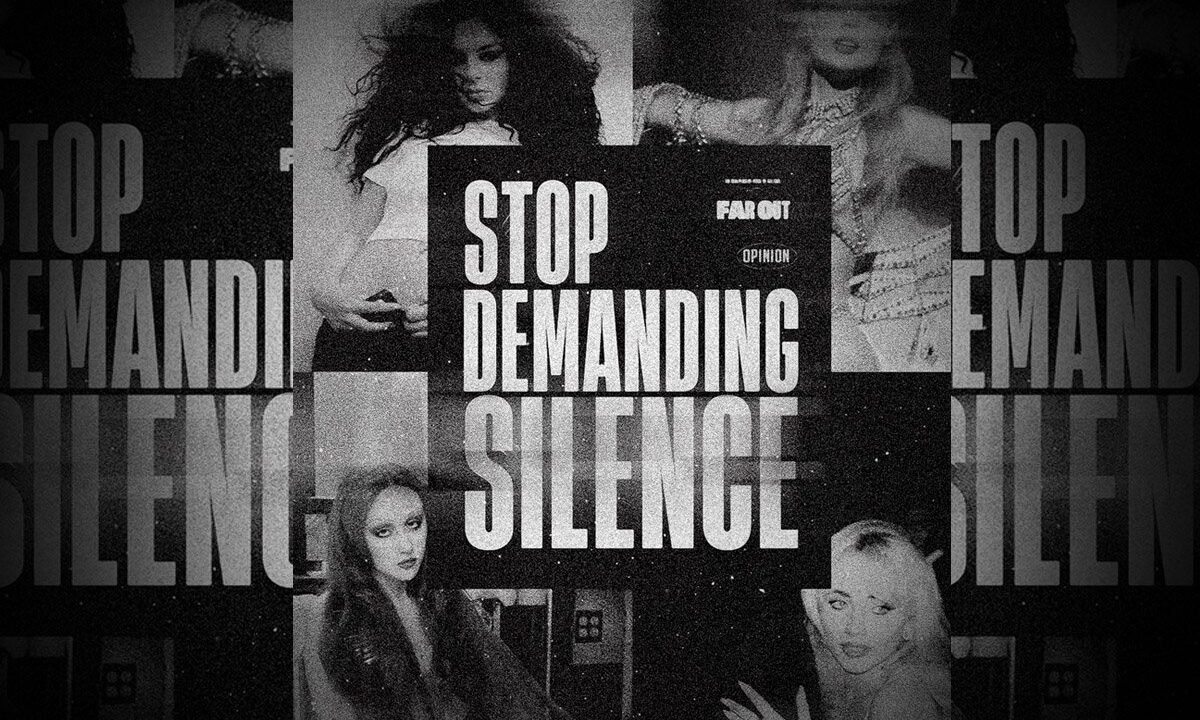

(Credits: Far Out / Charli XCX / Taylor Swift / Chappell Roan / Sabrina Carpenter)
It has been 482 days since Taylor Swift released her previous album. It has been 249 days since the last time she stepped on a stage for her Eras Tour. Earlier this week, the pop star announced her return with her 13th studio album, and for a choir of voices, that’s too soon.
As Swift announced The Life Of A Showgirl as her next release, there was quickly a familiar wall of voices claiming that she should have disappeared for longer. Comments show around words like “oversaturation” or “overexposure”, essentially arguing that they’ve seen and heard too much of the singer in recent years and that, in order to protect her career and essentially not piss people off or drive away fans, she needs to shut up and disappear.
It’s been a long time since fans had new music, though, particularly in comparison to the fast-paced world of today. It’s clear that she’s been lying low, or more likely still recuperating after the string of intense tour dates, where she made history by hosting the most attended and commercially successful tour ever.
But critics of Swift use that tour as the argument now. Some claim that after the media storm that surrounded each and every one of those dates, with any new detail or any special guest making headlines, and with the way the event seemed to make her looming presence over pop culture even stronger, there needs to be a detox. It was, indeed, a long tour – 632 days in total. But for context, Coldplay have now been on their Music of the Spheres tour for 1,245 days. That’s over three years, yet the calls telling Chris Martin to quieten down and disappear aren’t quite as loud. Or, at the very least, framed as jokes rather than demands.
I understand the opposing argument that an artist can hit a point of complete oversaturation. When a certain name is spoken of so consistently, it becomes fatiguing. Even as a Taylor Swift fan, I’ve regularly felt that about her, not so much through her own actions, but through the way in which she is handled by the media.
Swift releases a record, and it suddenly seems that on every single red carpet, every celebrity is being asked questions about her and her music, no matter if they’re associated or not. It becomes less about Swift herself accomplishing new work to keep herself present, and more about the way her name ends up being thrown around or brought up almost constantly, like a buzzword or a cheat code for a news line or a fan trap.

That is then reflected onto Swift. The exhaustion people feel around hearing her name so often is turned back on her as if she’s doing too much, is too present and in turn, needs to give people a break.
I’ve never heard that asked for a man before, though, but I have heard it asked constantly of the current set of women leading pop. As Sabrina Carpenter announced Man’s Best Friend, her new album that will arrive almost exactly a year after her last one, people said the same, wondering if it was too much too soon, and the world had seen enough of her for now.
The skyrocket of Chappell Roan quickly had people moaning that she was everywhere as her name appeared on countless festival lineups and her face appeared on a bunch of TV shows. Almost immediately after Charli XCX’s Brat era began, people were asking if it was getting exhausting and should end ASAP. It’s as if the second success is earned by a woman, the countdown begins until it becomes “annoying”.
“So tell me the truth, will you hate me if I stick around?”
Charli XCX
Charli XCX is now actively questioning this notion herself, saying she’s “interested in the tension of staying too long. I find that quite fascinating. What does that do?” But when have you ever heard the idea of ‘staying too long’ being raised against a man?
As Coldplay still stretch out a tour for an album they released in 2021, Ed Sheeran has been doing the same thing forever. No one’s getting at him to call it a day, are they? New male artists like Rolemodel are everywhere with no accusations of overdoing it, eh? Or even looking over into completely different musical worlds where acts like King Gizzard are often releasing several records in one year and being treated as exciting or impressively prolific for doing so, there’s a clear difference in the way women, and specifically women in pop, are handled.
“So tell me the truth, will you hate me if I stick around?” Charli XCX asked her fans at the end of another Brat show, clearly aware of the way in which a woman’s success becomes a time bomb. Swift herself mused on it years back in her documentary Miss Americana, claiming that she wanted to “I want to work really hard while society is still tolerating me being successful,” and addressing how that window of tolerance is smaller for women.
“Everyone’s a shiny new toy for like two years,” Swift said.
“The female artists I know have reinvented themselves 20 times more than the male artists, they have to or else you’re out of a job.”
Taylor Swift
That’s the other solution offered. If female artists refuse the calls to go away for a while and give people a break, and instead want to rightfully lean into their drive and prolific talent, the only other option is to make themselves new – again in a way that men don’t have to as they rock in with the same hair, in the same clothes, with the same stage set up and everything is fine to go on as it always has.
The consistent claim that female artists need to disappear for a while because they’re overexposed is bigger than merely a name being in the news too much. It’s symptomatic of a larger conversation about the way society sickens of successful women.
“Women in entertainment are discarded in an elephant graveyard by the time they’re 35,” Swift once said, and now, at age 35, she seems to be rallying against this outright, not only by release more music and refusing to disappear for any longer, but also in subtle wording as she uses “expires at” during her countdowns surrounding this new role out in a comment about the way women’s place in the public sphere seems to hit this ‘expiry date’.
That niggling, unplaceable feeling of annoyance that’s been branded as the result of “oversaturation” is more sinister than it’s surface. Rather than seeing these artists who endure in the public eye as captivating talents, or rather than celebrating the release of a new record as a sign that their talent is more active and motivated than ever, that them having more to say is exciting, instead, it’s simply society tiring of seeing a woman on top, with the misogynistic music world being no different to any other industry as it demands for women to sit down and shut up.
Related Topics





